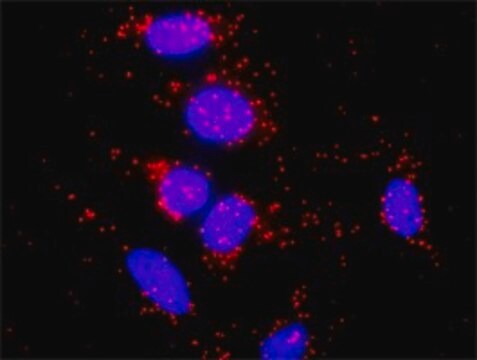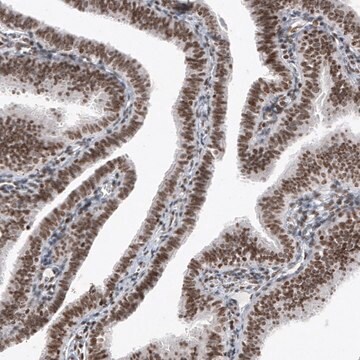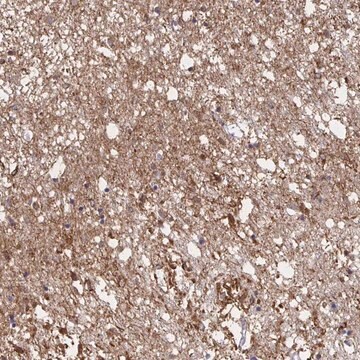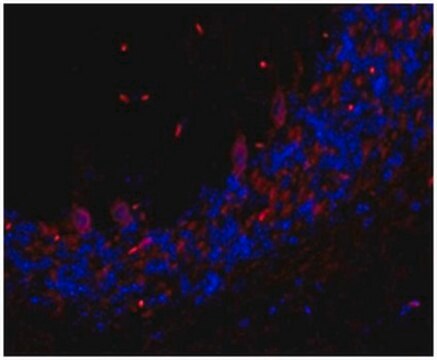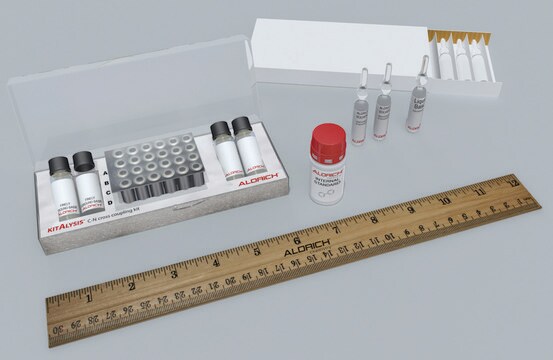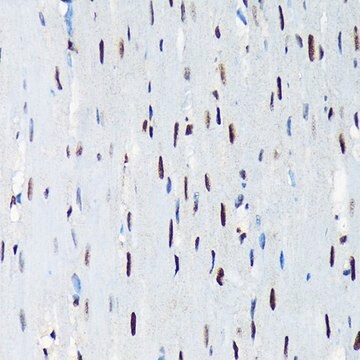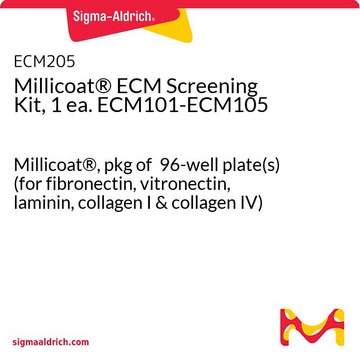HPA039441
Anti-SMCHD1 antibody produced in rabbit

Prestige Antibodies® Powered by Atlas Antibodies, affinity isolated antibody, buffered aqueous glycerol solution
同義詞:
Anti-AP001011.2, Anti-Structural maintenance of chromosomes flexible hinge domain-containing protein 1
登入查看組織和合約定價
全部照片(7)
About This Item
共軛:
unconjugated
application:
IF
IHC
IHC
無性繁殖:
polyclonal
物種活性:
human
citations:
8
技術:
immunoblotting: 0.04-0.4 μg/mL
immunofluorescence: 0.25-2 μg/mL
immunohistochemistry: 1:50-1:200
immunofluorescence: 0.25-2 μg/mL
immunohistochemistry: 1:50-1:200
推薦產品
生物源
rabbit
品質等級
共軛
unconjugated
抗體表格
affinity isolated antibody
抗體產品種類
primary antibodies
無性繁殖
polyclonal
產品線
Prestige Antibodies® Powered by Atlas Antibodies
形狀
buffered aqueous glycerol solution
物種活性
human
加強驗證
orthogonal RNAseq
Learn more about Antibody Enhanced Validation
技術
immunoblotting: 0.04-0.4 μg/mL
immunofluorescence: 0.25-2 μg/mL
immunohistochemistry: 1:50-1:200
免疫原序列
DNGRGMTSKQLNNWAVYRLSKFTRQGDFESDHSGYVRPVPVPRSLNSDISYFGVGGKQAVFFVGQSARMISKPADSQDVHELVLSKED
運輸包裝
wet ice
儲存溫度
−20°C
目標翻譯後修改
unmodified
基因資訊
human ... SMCHD1(23347)
免疫原
Structural maintenance of chromosomes flexible hinge domain-containing protein 1 recombinant protein epitope signature tag (PrEST)
應用
Applications in which this antibody has been used successfully, and the associated peer-reviewed papers, are given below.
Western Blotting (1 paper)
Western Blotting (1 paper)
特點和優勢
Prestige Antibodies® are highly characterized and extensively validated antibodies with the added benefit of all available characterization data for each target being accessible via the Human Protein Atlas portal linked just below the product name at the top of this page. The uniqueness and low cross-reactivity of the Prestige Antibodies® to other proteins are due to a thorough selection of antigen regions, affinity purification, and stringent selection. Prestige antigen controls are available for every corresponding Prestige Antibody and can be found in the linkage section.
Every Prestige Antibody is tested in the following ways:
Every Prestige Antibody is tested in the following ways:
- IHC tissue array of 44 normal human tissues and 20 of the most common cancer type tissues.
- Protein array of 364 human recombinant protein fragments.
聯結
Corresponding Antigen APREST81743
外觀
Solution in phosphate buffered saline, pH 7.2, containing 40% glycerol and 0.02% sodium azide.
法律資訊
Prestige Antibodies is a registered trademark of Merck KGaA, Darmstadt, Germany
免責聲明
Unless otherwise stated in our catalog or other company documentation accompanying the product(s), our products are intended for research use only and are not to be used for any other purpose, which includes but is not limited to, unauthorized commercial uses, in vitro diagnostic uses, ex vivo or in vivo therapeutic uses or any type of consumption or application to humans or animals.
未找到適合的產品?
試用我們的產品選擇工具.
儲存類別代碼
10 - Combustible liquids
水污染物質分類(WGK)
WGK 1
閃點(°F)
Not applicable
閃點(°C)
Not applicable
Marie-Cécile Gaillard et al.
BMC medical genetics, 17(1), 66-66 (2016-09-17)
The main form of Facio-Scapulo-Humeral muscular Dystrophy is linked to copy number reduction of the 4q D4Z4 macrosatellite (FSHD1). In 5 % of cases, FSHD phenotype appears in the absence of D4Z4 reduction (FSHD2). In 70-80 % of these patients, variants of
Richard J L F Lemmers et al.
Nature genetics, 44(12), 1370-1374 (2012-11-13)
Facioscapulohumeral dystrophy (FSHD) is characterized by chromatin relaxation of the D4Z4 macrosatellite array on chromosome 4 and expression of the D4Z4-encoded DUX4 gene in skeletal muscle. The more common form, autosomal dominant FSHD1, is caused by contraction of the D4Z4
Yosuke Hiramuki et al.
Skeletal muscle, 8(1), 24-24 (2018-08-04)
SMCHD1 is a disease modifier and a causative gene for facioscapulohumeral muscular dystrophy (FSHD) type 1 and type 2, respectively. A large variety of different mutations in SMCHD1 have been identified as causing FSHD2. In many cases, it is unclear
Camille Dion et al.
Nucleic acids research, 47(6), 2822-2839 (2019-01-31)
The DNA methylation epigenetic signature is a key determinant during development. Rules governing its establishment and maintenance remain elusive especially at repetitive sequences, which account for the majority of methylated CGs. DNA methylation is altered in a number of diseases
Chen-Yu Wang et al.
Nature communications, 10(1), 2950-2950 (2019-07-05)
X-chromosome inactivation triggers fusion of A/B compartments to inactive X (Xi)-specific structures known as S1 and S2 compartments. SMCHD1 then merges S1/S2s to form the Xi super-structure. Here, we ask how S1/S2 compartments form and reveal that Xist RNA drives their formation
我們的科學家團隊在所有研究領域都有豐富的經驗,包括生命科學、材料科學、化學合成、色譜、分析等.
聯絡技術服務